|
|
|
Sort Order |
|
|
|
Items / Page
|
|
|
|
|
|
|
| Srl | Item |
| 1 |
ID:
101767
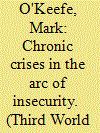

|
|
|
|
|
| Publication |
2010.
|
| Summary/Abstract |
This aim of this paper is two-fold. The first aim is to expand on a claim that an 'Arc of Insecurity' stretches across sub-Saharan Africa. The second is to explore the difficulties of chronic crises within this arc. The paper will contrast countries that have experienced the following three indicators used to highlight the acute phase of a chronic crisis: conflict-related mortality, displacement and climatic disasters. The second part of the paper discusses 'chronic crisis' situations by utilising a case study of Karamoja, northeast Uganda. Karamoja is characterised by the worst humanitarian and development indicators in Uganda and its problems are indicative of other chronic situations. While countries, or more specifically, situations within countries, can be insecure, every situation remains unique. Responses to chronic situations need to be based on a solid understanding of the political-economic causation of crisis.
|
|
|
|
|
|
|
|
|
|
|
|
|
|
|
|
| 2 |
ID:
080700
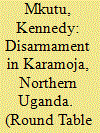

|
|
|
|
|
| Publication |
2008.
|
| Summary/Abstract |
Disarmament is a major feature of international, regional and national small arms and light weapons control policy and legislation worldwide. The proliferation of arms is now a significant problem amongst pastoralists in the Horn of Africa. In Karamoja, northern Uganda, where armed inter-communal and intra-communal conflict is disrupting lives and livelihoods, several attempts at mitigation have been tried. This article considers whether disarmament attempts have provided any solution to the conflicts. Empirical data collected between 2000 and 2006, consisting of interviews with combatants, local leaders and community members, government reports and media articles have been used to recount these endeavours and their consequences in the communities. The work first gives the regional and cross-border arms dynamics. It then considers the history of conflict and disarmament in Karamoja and examines in detail the recent disarmament since 2001. The successes or failures are considered in terms of weapons collected, mitigation of conflict and establishment of valuable processes such as community participation or inter-agency cooperation
|
|
|
|
|
|
|
|
|
|
|
|
|
|
|
|
| 3 |
ID:
164828
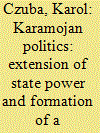

|
|
|
|
|
| Summary/Abstract |
State-making processes that occur in peripheral areas and the role that local political elites play in such processes have not been adequately explored by scholars. This article investigates these important phenomena through the lens of the Ugandan state’s presence in Karamoja, in the country’s northeast, which until the early years of the twenty-first century was very limited. Rapid extension of the power of the Ugandan state in the region, upon which the country’s rulers have embarked in the last decade, has radically altered existing governance arrangements in Karamoja and led to the formation of a subordinate Karamojan political elite. This elite has been instrumental in government efforts to establish control over the region’s population and shaped this state-making process in important ways.
|
|
|
|
|
|
|
|
|
|
|
|
|
|
|
|
| 4 |
ID:
182430
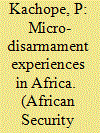

|
|
|
|
|
| Summary/Abstract |
Micro-disarmament, which refers to the removal of small arms and light weapons (SALW) from the civilian population, is one of the recent international policy frameworks through which the global challenge of illicit gun proliferation has been approached. Although Africa still grapples with this challenge, a number of successful micro-disarmament programmes have been implemented from which important lessons can be drawn. One such success story has been the disarmament of pastoral communities in the Karamoja region of north-eastern Uganda under the Karamoja Integrated Disarmament and Development Programme (KIDDP). This paper argues that even though micro-disarmament success may be context specific, there are generic conceptual and practical lessons that should be learned from the KIDDP. Particularly, the paper argues that a human security approach anchored on a well-coordinated multi-actor structural framework is an essential lesson from the KIDDP which can benefit the rest of the African communities still grappling with the management of small arms infiltration.
|
|
|
|
|
|
|
|
|
|
|
|
|
|
|
|
| 5 |
ID:
151535
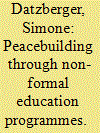

|
|
|
|
|
| Summary/Abstract |
Experts increasingly refer to the crucial role of education in cultivating processes of sustainable peacebuilding in conflict-affected environments. While peacebuilding interventions have slowly started to place emphasis on aspects of equality or service delivery in formal education systems, the potential of non-formal education (NFE) programmes to foster social transformation in conflict-affected environments often remains unexploited. There is little research examining how NFE can affect the security situation and peace process in a conflict-affected region, or the role it plays in peacebuilding at large. To address these questions, the article draws on the case study of the Alternative Basic Education Karamoja (ABEK) programme in Uganda. It is based on a multi-track data collection strategy involving visits to learning centres, focus group discussions and interviews with government officials, teachers, youth, civil society organizations and other stakeholders over a period of three months in 2015. The study finds that, despite persistent implementation challenges, ABEK proved to (a) be relevant to the security and conflict conditions in the region; and (b) overcome structural and indirect forms of violence through alternative and flexible modes of education. The ABEK case therefore gives rise to much wider peacebuilding implications and formal education sector planning in conflict-affected environments.
|
|
|
|
|
|
|
|
|
|
|
|
|
|
|
|
|
|
|
|
|